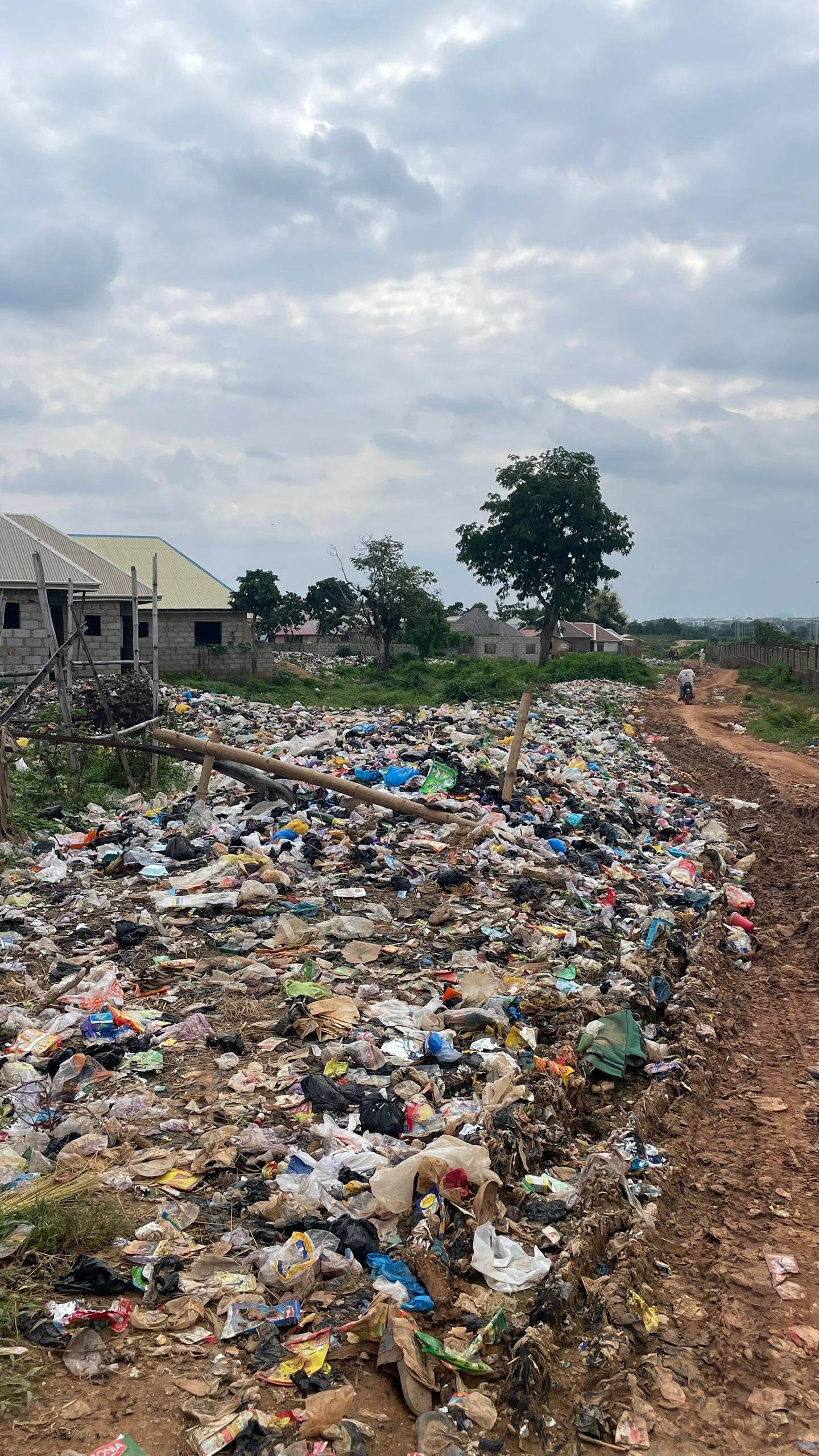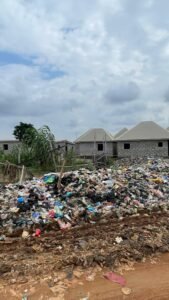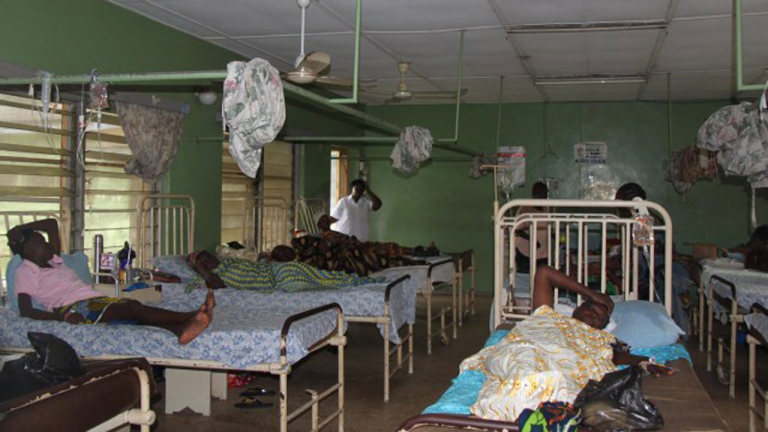
An open dumpsite stands at the entrance of Karonmajiji, greeting both residents and visitors with piles of waste
ABUJA, Nigeria – Just ten minutes from Abuja’s polished highways, Karonmajiji settlement battles a different reality—one where waste piles higher than rooftops, the air reeks of decay, and children cough their way through preventable illness.
In this report, Chukwu Obinna delves into how indiscriminate waste disposal is creating a slow-burning public health disaster in Karonmajiji. The story goes beyond dirty streets: it reveals how neglect, poor planning, and fragile community resilience are locking residents into cycles of disease, poverty, and inequality—all directly undermining Nigeria’s commitment to the Sustainable Development Goals (SDGs).
Hidden Waste Crisis: A Settlement Drowning in Refuse
Karonmajiji sits along Abuja’s busy Airport Road. Yet while the city centre projects order and modernity, Karonmajiji is suffocated by open dumpsites—rotting food, plastics, and household waste spilling metres from people’s doorsteps.

“The smell enters our rooms daily,” lamented Musa Ibrahim, a father of four. “When it rains, dirty water flows into our compound. My children always complain of stomach pain.”
For shopkeeper Aliyu Garba, the waste is more than a health hazard—it is bad for business. “Customers complain about the smell and avoid my shop. I lose money every day.”
Nigeria’s Bigger Picture: Waste, Cholera, and Missed SDGs
The crisis in Karonmajiji reflects Nigeria’s wider waste management failure.
According to the World Bank, more than 90 per cent of waste in low-income nations, including Nigeria, is dumped openly and untreated.
This practice directly undermines SDG 6 (Clean Water and Sanitation), which promises adequate sanitation and the end of open defecation by 2030. The setback is severe.
In Nigeria, the consequences are grim: in 2021 alone, cholera killed at least 3,604 people, making it one of the deadliest preventable epidemics while in 2024 year on year report, Nigeria saw a 239% increase in cholera deaths with 359 fatalities recorded, according to the Nigerian public health agency.
Cholera is not the only threat. Diarrhoea, malaria, typhoid, and respiratory diseases also thrive in unhygienic environments—slowing progress on SDG 3 (Good Health and Well-Being), which aims to end epidemics.
Public Health at Risk: Doctors Sound the Alarm
Medical professionals warn that Karonmajiji’s waste problem is not merely unsightly; it is deadly.
In an exclusive interview with the Africa Health Report, (AHR), Dr. Uba Ike, a public health expert explained: “Open dumpsites are breeding grounds for diarrhoea, cholera, and typhoid pathogens. Stagnant wastewater becomes mosquito pools, fuelling malaria. Beyond this, the stench causes respiratory discomfort. It is a multi-layered health crisis.”
Studies show that open dumping contributes to more than half of malaria cases in peri-urban Nigerian communities, with children the most vulnerable.
The Economic Cost of Indifference
Indiscriminate waste disposal is also an economic burden. Families spend scarce income on hospital visits. Traders lose customers. Youths are trapped in cycles of ill-health that undermine productivity.
This reality sabotages SDG 1 (No Poverty) and SDG 8 (Decent Work and Economic Growth).
As community elder, Rahmat Mohammed put it: “The government cannot wait until an epidemic breaks out. We deserve the same clean environment as people in the city centre.”
Youths Fighting Back: Community Efforts Against the Odds
Despite limited resources, Karonmajiji’s youths have mobilised. Youth leader Ahmed Abubakar described their monthly clean-up drives:
“Every Saturday, we gather to clear refuse and burn what we can. But without proper collection trucks or bins, our work only scratches the surface.”
Their resilience echoes SDG 11 (Sustainable Cities and Communities)—proof that grassroots action matters. But, as Abubakar stressed, “Community effort cannot replace government responsibility.”
Government’s Slow Response: Promises and Gaps
The Federal Capital Territory (FCT) has seen a flurry of development projects flagged off by Minister Nyesom Wike, with promises to address urban sanitation challenges. Yet dumping activities remain rife in Karonmajiji, exposing the failure to provide adequate facilities for waste disposal.
Officials from the Abuja Environmental Protection Board cite funding gaps and urbanisation pressures. But to residents, these are excuses, not solutions.
“We are also citizens of Abuja,” Mrs. Mohammed reminded. “Why should clean air and safe water be a privilege?”
Global Context: Why Karonmajiji Matters
The World Health Organisation warns that unsafe waste disposal is a global health hazard, contributing to respiratory diseases, water contamination, and climate change. it also highlights that cholera transmission is tightly linked to inadequate sanitation and poor waste disposal.
What is happening in Karonmajiji mirrors struggles across Africa’s rapidly urbanising cities—where informal settlements absorb population growth but rarely receive adequate infrastructure.
Failure to act risks not only health outcomes but also Nigeria’s SDG commitments, particularly:
SDG 3: Good Health and Well-Being, SDG 6: Clean Water and Sanitation, SDG 10: Reduced Inequalities and SDG 13: Climate Action.
Towards Solutions: What Needs to Change
Experts propose a three-tiered strategy for settlements like Karonmajiji: Government Investment – Waste bins, trucks, and designated disposal sites, Public Awareness – Education on safe disposal, recycling, and hygiene and ensure community-Government Partnership to Scaling grassroots initiatives with technical and financial support.
International models—such as Rwanda’s community-led clean-up campaigns or Kenya’s recycling hubs—offer examples of practical interventions that Nigeria could adopt.
Waiting for Clean Air
For families of Karonmajiji, the waste crisis is not theoretical. It is the smell that enters their homes, the water that poisons their children, and the mosquitoes that breed in stagnant pools.
As piles grow and illnesses spread, the question remains: How long will residents wait for meaningful change?
Until answers come, the community will keep sweeping, coughing, and hoping—while their future is buried under the waste of neglect.




